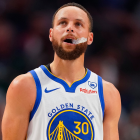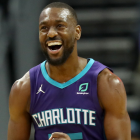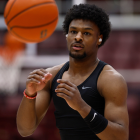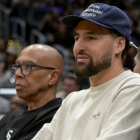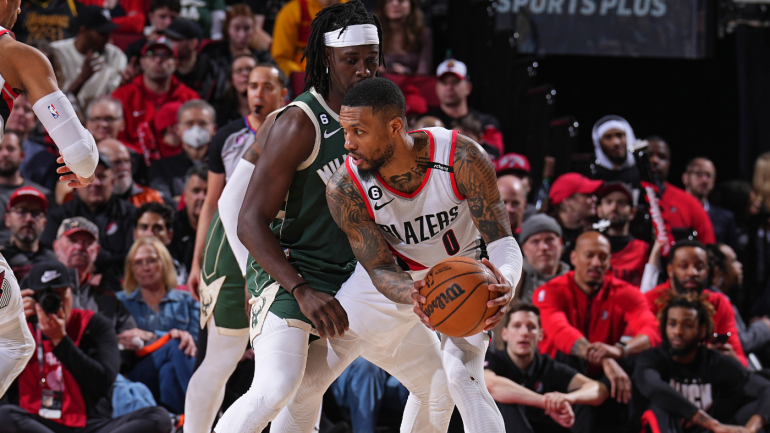
Damian Lillard and Giannis Antetokounmpo are teammates. Lillard, who turned 33 in July and is coming off the best season of his 11-year career, was traded to the Milwaukee Bucks in a three-team blockbuster on Wednesday.
In return for their franchise player, the Portland Trail Blazers acquired center Deandre Ayton and forward Toumani Camara from the Phoenix Suns, plus an unprotected 2029 first-round pick and two unprotected pick swaps (2028, 2030) from the Bucks. They also added star guard Jrue Holiday from Milwaukee, but is widely expected to be rerouted to a contender.
In addition to sending Lillard to Milwaukee, Portland sent center Jusuf Nurkic, forward Nassir Little and guard Keon Johnson to Phoenix. The Suns also acquired sharpshooter Grayson Allen from the Bucks.
This is the kind of trade whose ripple effects will be felt all around the league. What moves will the Miami Heat, who were Lillard's preferred destination and have two open roster spots, make now? Do the Toronto Raptors, who were linked to Lillard in recent days, have something else up their sleeves? How might this affect trade talks involving disgruntled Philadelphia 76ers star James Harden?
For now, though, we'll focus on the ramifications for the three teams that are directly involved. Let's grade the trade.
Bucks grade: B+
First, the macro: Milwaukee's franchise player can hit free agency in 2025 and has repeatedly said that he'll leave if he doesn't feel the organization is as committed as he is to winning another championship. The Bucks flamed out in the first round against Miami a few months ago, and, while they were able to retain Khris Middleton and Brook Lopez this summer, they didn't do much to address their longstanding issues with halfcourt offense. Had they not taken a big swing like this, they would have effectively been counting on the 33-year-old Holiday, 32-year-old Middleton and 35-year-old Lopez to find some kind of new formula under new coach Adrian Griffin. Lillard is in that same age bracket, but Milwaukee has never had a playmaker like him. Ideally, this trade will ensure Antetokounmpo signs another contract with the team that drafted him 10 years ago and give the entire franchise a sense that it is cooking up something special rather than trying to reheat something stale.
Now, the micro: The Bucks, health permitting, should have a better halfcourt offense than they ever did in the Mike Budenholzer era. They should not get stagnant against elite playoff defenses, they should not lose their poise in crunch time and they should not suffer that much if Middleton regresses a bit as a creator. As a result of injuries and roster construction, Antetokounmpo set new career highs in usage (37.3%), and field goal attempts (20.3 per game, 29.2 per 100 possessions) last season, and you can expect those numbers to drop significantly. Lillard's presence means Antetokounmpo (and Middleton, for that matter) will have a lighter load and take easier shots.
Milwaukee's challenge is to make sure that the offensive boost is not completely offset on the other end. Holiday is one of the league's premier defenders: a terror at the point of attack, a top-tier screen navigator and as switchable as any 6-foot-5 player has ever been. Lillard himself has called him the best defender in the league. The Bucks do not have anyone on the roster who can approximate what Holiday did for them defensively for the past three seasons, and they might have some remorse about letting Jevon Carter, another mean point-of-attack guy, get away in free agency. After putting more defensive responsibility on Lopez's shoulders last season by dialing down its help defense, Milwaukee is now testing the rim protector's limits -- we know he and Antetokounmpo can cover up mistakes on the perimeter, but, dating back to the days of Eric Bledsoe and Malcolm Brogdon, the first line of defense has always been a big, strong, physical guard.
Fortunately for the Bucks, today is not the trade deadline. It is possible that wing Marjon Beauchamp, who had some promising moments as a rookie, particularly on the defensive end, quickly develops into the type of player that can either A) produce on both ends in the playoffs or B) be traded for someone who can. If that does not happen, though, the team defense will not have much margin for error, and, given all the picks that are out the window, neither will the front office.
Blazers grade: B
Portland and Phoenix swapped bigs who have been on the trade block forever, and it makes sense that the Blazers got the 25-year-old one. And while getting only one first-round pick outright in exchange for a Hall of Famer might sound bad, that's not the way to look at it. In June 2028, when the first Bucks pick could go to Portland, Lillard will be weeks away from his 38th birthday and Antetokounmpo will be a few months older than Lillard is now. The Blazers will definitely get Milwaukee's pick a year after that, and they will have the option to swap picks again another year later. They are betting that, by then, the Bucks' title window will have closed. Given the roster-building restrictions that Milwaukee's front office will face in the next few years with Lillard's enormous salary on the books, this seems like a smart bet.
Holiday's trade value is baked into this deal, so any assessment of how Portland fared will be more accurate once he's on another team. One factor at play: Holiday, who has a $37.4 million player option for 2024-25, will be eligible to sign an extension (worth up to $223 million over four years) six months after he is traded again. Is he willing to give certain teams assurances that he'll do so? This will affect what kind of offers the Blazers are able to find, but Holiday is undoubtedly the kind of player a contender would part with young players and picks to acquire. It worked out well when the Bucks did it.
Ultimately, the bigger variable here is how Ayton develops. He starred in his role in the Suns' 2021 Finals run, but did not stay on that trajectory. Ideally, Portland will be the perfect place for him -- there's room for him to expand his offensive game, and, if he can consistently bring the defensive scheme versatility that he had during his most productive stints in Phoenix, then the former No. 1 overall pick can get his career back on track. In a worst-case scenario, Ayton approaches this as nothing more than an opportunity to show what he can do with the ball in his hands ... but even then, at least the Blazers were finally able to shed Nurkic's contract. Worth a shot!
Suns grade: B+
Remember all those stories about how much Frank Vogel loves Ayton? The NBA is funny.
This one is pretty simple: Ayton might end up being (way) better than anyone Phoenix got in this deal, but it probably wasn't going to happen in Phoenix. The Suns are maybe the most all-in team in history, and if the starting center's relationship with the team was beyond repair, then they needed a new starting center.
Phoenix's depth, which was a clear weakness in the immediate aftermath of the Kevin Durant trade, is now a massive strength. Take the center swap out of it, and Allen and Little add to the already long list of role players the front office managed to add this offseason despite only having minimum contracts to offer free agents. (They can also be added to the list of potential fifth starters.) In fact, the Suns now have literally too many guys -- 17 players are signed to standard contracts, and that number must be reduced to 15 before opening night. This is potentially bad news for Ish Wainwright, whose contract is not guaranteed, and it means Johnson could be on the move again.
Offensively, Nurkic should thrive in Phoenix. Vogel can use him as a hub, and his screening will help the Suns' many shooters get open looks. As a passer, he's a clear upgrade over Ayton, which will make it more difficult for teams to trap Durant, Devin Booker and Bradley Beal. The risk here, though, is that this trade might have lowered the Suns' defensive ceiling. Due to age and injury history, Nurkic seems less likely than Ayton to return to form as a pick-and-roll defender. It will help to have Durant roaming on the weak side, but if Nurkic gets played off the floor in the conference finals, who is replacing him? Drew Eubanks? Chimezie Metu? Smallball? All imperfect answers.
Despite this risk, it's easy to understand Phoenix's rationale, particularly when you factor in what it has done to its cap sheet. Allen (who will feast on open 3s) is owed $8.5 million over each of the next two seasons, Little (a steal if he makes his 3s) is owed a total of $28.5 million over the next four and Johnson is still on his rookie deal. The Suns have essentially broken up Ayton's max contract into several smaller, tradable ones, giving the coaching staff and front office more pieces to play with as they try to shape this new group into a championship favorite.
What number will Damian Lillard wear for the Bucks?
Damian Lillard will wear No. 0 for the Bucks following the trade. New Damian Lillard Bucks jerseys are already available. Visit Fanatics to score all-new Damian Lillard hunter green and white jerseys right now.
We may receive a commission for purchases made through these links.










